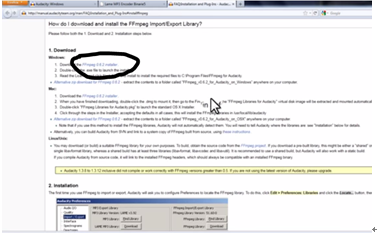


If required, you can also configure to enable or disable particular encoding/decoding libraries. Configure the build with -enable -shared so that it builds the necessary shared object library (.so) files. To build libav, obtain the source code from the libav project. To build FFmpeg, obtain the source code from the FFmpeg project. It is recommended to use a shared build, but Audacity will also work with a static build. A static build consists of a single libavformat library, whereas a shared build has at least three libraries (libavformat, libavcodec and libavutil). If you download a pre-built library, this might be either a "shared" or "static" build. You may download (or compile) and install a compatible version of the FFmpeg or libav library for your purposes then locate it in Libraries Preferences. In this case, no additional installation is required, You can find links to other useful Open Source audio and audio-visual applications, that you can download and use, in the Audacity Wiki.Some distributions (including Ubuntu), include FFmpeg by default when Audacity is installed from the official distribution repository.Other Open Source Audio and Audio-Visual Applications You may copy, distribute, modify and/or resell Audacity, under the terms of the GNU GPL.To build Audacity yourself, download the source code.Although there are a number of sellers of Audacity software on ebay, Amazon, Microsoft Store and Apple Store, none of these sellers are affiliated to Audacity, and none have contributed in any way to the Audacity project.Source code and user manuals for some old versions are available on FossHub, as well as AppImages since version 3.0.3. For Linux, the appropriate version of Audacity for your operating system is usually included in your distribution’s repository.For macOS 10.12 (Sierra) and earlier, legacy versions of Audacity are available on the Legacy Mac downloads page.For Windows 7 and earlier, legacy versions of Audacity are available on the Legacy Windows downloads page.


 0 kommentar(er)
0 kommentar(er)
